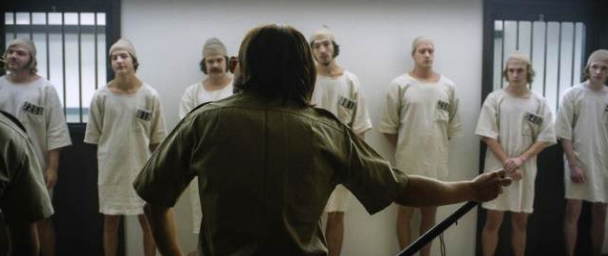Nathaniel again, down to my final two Sundance movies. (Michael stayed longer so he has more coming)
The Outsiders. School Ties. Go. Mean Girls. Dazed and Confused... These are movies people often marvelled at after the fact for capturing multiple future stars in the same ensemble before the title of "star" sat completely well on them. Certain movies function like abnormally prescient time capsules in that way and, who knows, perhaps The Stanford Prison Experiment will one day be among them?
 "Guard" terrorizes "Prisoners" in THE STANFORD PRISON EXPERIMENT
"Guard" terrorizes "Prisoners" in THE STANFORD PRISON EXPERIMENT
It's not that the faces are complete nobodies exactly but, apart from Billy Crudup, as the possibly awful Dr. Philip Zimbardo who is behind the psychological experiment in situational behavior, most of them are lesser known. Or, if they're already rising stars, they don't exactly have that signature role or household name factor just yet.
 The Standford Prison Experiment was a famous study from the 1970s in which a psychology professor and his team took a simple ad out in the paper for students to participate in a "psychological study of prison life" for 1 to 2 weeks for $15 a day. Students signed up thinking it was easy money but easy it was not...
The Standford Prison Experiment was a famous study from the 1970s in which a psychology professor and his team took a simple ad out in the paper for students to participate in a "psychological study of prison life" for 1 to 2 weeks for $15 a day. Students signed up thinking it was easy money but easy it was not...
In their entrance questionnaires, at least as presented in this historical drama, almost all of the volunteers wanted to play "prisoners" rather than guards because they thought it would be that much easier.
On the Academic side of this triangulated drama are character actor faces like Olivia Thirlby (Juno), James Wolk ("not great, Bob!") and Nelsan Ellis (determined to have a post True Blood career in the movies!) but the heart of the movie is in the two teams of guinea pigs chosen for the experieemnt and the fresh faced male cast playing them.
After selections are made, Crudup and his team divvy up the headshots like their casting a reality show with half of the students as "The Guards" and half as "The Prisoners" This next part feels like fictional embellishment since the final two polaroids are of Michael Angarano and Ezra Miller. It's eenie meenie mo which becomes guard and which becomes prisoner, and they then become the defacto leads (and standouts) of their respective social groups. Angarano fashions himself into a sadistic southern lawman right out of the movies and Miller becomes the most rebellious and then craziest of the prisoners.
 Johnny Simmons, Ezra Miller, and Chris Sheffield are questioned by the Guards
Johnny Simmons, Ezra Miller, and Chris Sheffield are questioned by the Guards
But the casting of rising stars doesn't end there. There's also Tye Sheridan (Mud), Ki Hong Lee (The Maze Runner), Thomas Mann (Project X), James Frecheville (Animal Kingdom), Johnny Simmons, Brett Davern, Jack Kilmer, Matt Bennett, Moises Arias, Callan McAuliffe, Nicholas Braun, Jack Kilmer, Jesse Carere, and Harrison Thomas. My personal favorite of the faces that were least familiar to me was Chris Sheffield (The Maze Runner) as Prisoner #2093. This handsome actor recalls Armie Hammer a bit, without all the accrued baggage of bad movies, and he can really hold a close-up. He's the most ramrod straight of the prisoners, quick to obey orders and never draw attention but the guards finally find his weak spot and thus a way to humiliate him, too.
For in this petri dish of human behavior, terrible impulses emerge as morals vanish. The prisoners unravel when they're denied basic human right and even their identities, forced to learn and use their new name (their prisoner # and only use that). The guards give in to the corrupting power of authority even becoming violent which the experiment forbade. Meanwhile the psychologists look on, some with more human concern than others, about the well being of the students.
For all of its potent scene-by-scene drama, though, there's something about The Stanford Prison Experiment that doesn't quite coalesce. Though well made and acted, it's less a great movie than great subject matter. It's easy to see why this true story has been written about so frequently and inspired more than one previous movie.
 The original book by the psychologist and other movies it inspired.
The original book by the psychologist and other movies it inspired.
The Standford Prison Experiment runs a full two hours but the material practically demands a grim pay cable miniseries. There's something about the collective group character arcs of Observers, Prisoners, and Guards -- essential to a movie about social theory -- that needs more time to develop to feel fully plausible and horrifying. Time is hard to measure when you're locked in a single room without windows but even so 24 hours seems awfully fast for people to unravel this quickly. The boys in Lord of the Flies held out a smidgeon longer than that, didn't they? This new version of the infamous story is never less than engaging, but perhaps the film needed a more confrontational POV than one designed to procure a PG-13 to achieve maximum effect?
[MAJOR SPOILER ALERT] When the plug is finally pulled -- this is a True Story and the Experiment ended as it always intended to, albeit a bit earlier -- the decision is tied, in editing and narrative structure to a rather tame scene of straight-boy sexual humiliation. Maybe it just seems tame as a gay man but of all the indignities the prisoners face, this seems less psychologically or physically damning than some of the others and yet it's the one where the boss is like "this has gone too far!" [/MAJOR SPOILER]
Grade: B